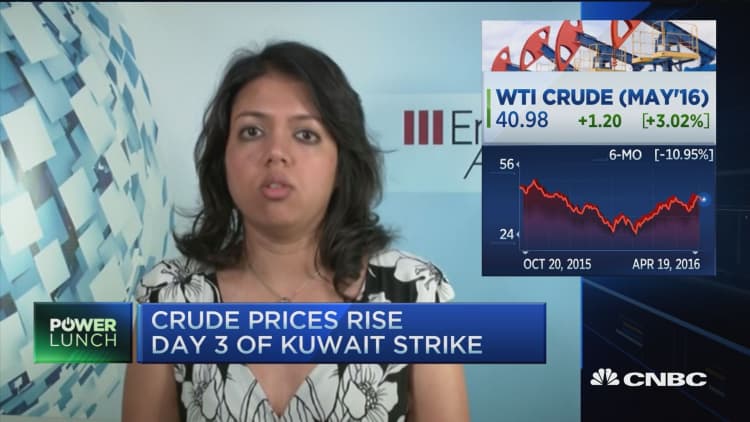
Striking Kuwaiti oil workers significantly disrupted oil production, temporarily halting production of about the same amount of crude that the world is oversupplying each day.
The three-day strike was ended Tuesday evening, according to a Reuters report. While analysts had expected a quick end to the strike, they say it does send a message to other producing nations that have implemented austerity as a result of falling oil prices.
The unanticipated strike in Kuwait took about 1.5 million barrels out of daily production, according to reports. Workers went on strike because of pay and benefit cuts. The world overproduces upward of 1.5 million barrels a day.
"It shows things can shift fast ... there was a working assumption on Friday that no production would be offline," said Helima Croft, global head of commodity strategy at RBC Capital Markets.
West Texas Intermediate futures for May gained 3.3 percent on Wednesday to settle at $41.08 per barrel. June futures were up 3.1 percent, to $42.47 per barrel. May futures expire Wednesday.
"Eventually all these workers' strikes get resolved. It's just a matter of time. I think it is kind of indicative of a broader symptom of a low-price environment, especially for the workers of national oil companies, where there's sometimes a disconnect between salaries and the market price," said Michael Cohen, head of energy commodities research at Barclays.
"Whether it's Pemex or Petrobras or Aramco, there's going to be implications of the low-price environment for all those workers and they're going to want to be shielded from the low market price. From our perspective, we see the level of unrest becoming more elevated in the summer months, particularly in the Middle East if prices stay very low," said Cohen.
Read MoreForget Doha, oil oversupply gone this year: Hamm
He said even Saudi Arabia, where the government keeps tight control, could see unrest in the eastern region which is home to the country's minority Shiite population. The Saudi royal family is Sunni Muslim.
"Labor unrest has been mitigated by a steady flow of money. When that money is sopped up or used for things like defense spending, people get upset," he said.
Cohen said the market has been ignoring geopolitical events due to the large surplus of crude in the world, but he's been warning that that could change.
Croft expected the strike to be settled quickly. But she does expect other leaders in the region to take note.
"Kuwait is a country with an active assertive parliament, and they have active street protests. What I think about Kuwait, is does this turn into a broader protest against austerity," Croft said. She said the fact that Kuwait does have a more-open society where citizens can freely protest, provides it a sort of escape valve.
Read MoreOil is falling, but U.S. keeps pumping—here's why
Oil prices Tuesday defied expectations, surging on the Kuwait strike instead of dropping after the weekend's failed meeting of crude-producing nations. Oil was lower after the report and also after a new report showing a bigger U.S. inventory build.
If there had been an agreement between the OPEC and non-OPEC producers in Doha, Qatar, this past weekend, crude output would have been frozen but not cut. Still, analysts had expected a deal to provide bullish support for prices which had been rising for weeks ahead of the meeting.
Societe Generale's global head of oil market research, Michael Wittner, said the market focus will be on supply. He expects a sub-$40 price for oil in the second quarter, with $38 per barrel for Brent and $36 for WTI.
But Wittner said there could be disturbances in other countries beyond Kuwait.
"We had another force majeure in Nigeria. We're now up to 0.4 million barrels a day of slight sweet offline in Nigeria," he said.


